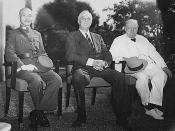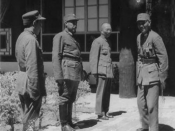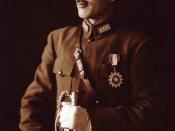A. IntroductionIn my Essay I will be focusing on the Role of the Sino-Japanese War against other factors for Communist victory in Chinese Civil War. My objectives are to examine the strengths and weaknesses of the Communist and Nationalists respectively during the Sino-Japanese War (1937-1941) and analyse how this in turn contributed to Communist victory. Upon which I will elaborate on the other factors that contributed to Communist success in the Civil War (1945-1949) and compare and gauge their effectiveness relative to each other. My sources include the Singapore National Libraries reference books, various book extracts, propaganda cartoons, research notes and Internet websites.
B. Summary of evidenceIn 1931Japan had taken advantage of the unwillingness of European Countries to stand up to its expansionist's policies to expand in China especially as Chiang Kai Shek was occupied with eliminating the Communists. However Japan's army was stretched thin holding the major cities and the railway and river lines of communication connecting them.
[1] Japanese troops were seldom seen in the rural areas remote from the Japanese network. Despite strong feelings against a second front from Mao Zedong especially fearing it would entail similar subordination to the (KMT) during the 1923-1927 alliance, the second front started because of the protests of the people and Mao Zedong took full advantage of the situation offered eventually causing the end of the (KMT) monopoly of political power and legitimacy. [2][1] China at war 1901-1949 Edward L. Dreyer page 210[2] Rebellions and revolutions China from the 1800s to 2000 - oxford university press, Jack Gray, General Editor J.M. Roberts.
After the end of the Japanese occupation, The Chinese people looked forward to the restoration of peace however were treated as traitors by the Kuomintang (KMT) regime. The latter imperfect even before 1937 had become still more corrupt and...



Hello
I am the author feel free to post any queries you have here
1 out of 2 people found this comment useful.